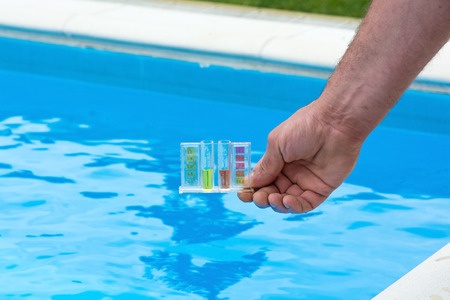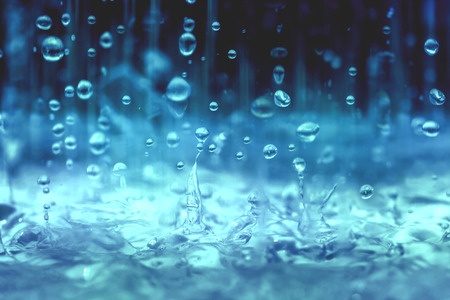It’s Spring! Here’s a Quick Recap on Pool Chemicals
Publication date : Tuesday, April 26th, 2016
 With pool season just around the corner, we thought it would be a good idea to do a quick refresher on how to best keep your swimming pool clean.
With pool season just around the corner, we thought it would be a good idea to do a quick refresher on how to best keep your swimming pool clean.
Balancing Pool Chemicals
The best way to keep your water sparkling clean is through the use of pool chemicals. However, balancing these chemicals is what’s most important. If you add too much, your water will be cloudy and can burn the skin and eyes. If you add too little, the water won’t be sanitary.
Testing your pool water should be done 2-3 times a week to ensure comfort, safety and sanitization. It’s a commitment, but this will help you get the most out of your investment. No one wants to swim in dirty water, after all.
Fortunately, today’s pool testing strips making testing your water relatively easy. Dip the strips into the water to check for calcium levels, sanitizer levels, pH and total alkalinity.
Sanitizing Your Pool Water
Calcium
Chlorine is the most popular way to sanitize a pool, and for good reason. Chlorine products won’t break down in the sunlight, and they sanitize and kill bacteria. Chlorine also helps keep the water clean and clear. It’s available in a variety of forms, including tablets and sticks.
Bromine
Another way to sanitize pool water is with bromine. Bromine is a reliable way to keep your pool clean, but it’s best for warm water and spas. Bromine remains active longer than chlorine, but it does have some limitations. If you plan on using bromine, you should have an automatic brominator installed. Also, it’s not available in all markets, and it’s more costly to purchase.
Shocking Your Swimming Pool
Shocking your pool is another way to keep it clean. It’s a critical step you can’t miss.
Shocking refers to the process of adding chlorine chemicals to raise the level to a point where contaminants are destroyed. These contaminants can include algae, combined chlorine and bacteria that come from people, the environment and other factors.
It’s also recommended that you add algaecide after every shock treatment so that you prevent any additional growth of algae.
There are other chemicals that you don’t want to ignore, such as those that help with metals, alkalinity, calcium hardness and pH balance.
If you need help with anything, call Paradise Pools. We are pros at keeping pool water sparkling clean, and we can recommend the right steps based on how your water is testing. You may also find that one of our maintenance plans will save you time and money, so ask about them when you call!
How Does Rain Affect My Pool Water?
Publication date : Monday, April 11th, 2016
 Rainwater has acidic properties that can affect the water in your swimming pool. This happens because rainwater absorbs industrial gases in the atmosphere. So what do you do if the weather is calling for rain?
Rainwater has acidic properties that can affect the water in your swimming pool. This happens because rainwater absorbs industrial gases in the atmosphere. So what do you do if the weather is calling for rain?
A little bit of rainwater shouldn’t do much damage. A heavy rainfall can. Let’s learn a bit more about why rainwater can affect your pool water.
Why Does Rain Make a Difference?
Rainwater has a naturally lower pH than what you keep your pool at. Most swimming pools are kept around 7.4 to 7.6. Rainwater, on the other hand, has a pH of around 5.0. If enough rain falls into the pool, it can lower the pH levels.
The reason why pools are kept at a higher pH is because the human eye has a pH of 7.5. Fluctuations in the pH can lead to serious discomfort such as burning. That’s why you sometimes hear people complaining of their eyes burning when they swim. This isn’t the chlorine causing the burning, but the pH level.
Do I Have to Adjust My pH Every Time it Rains?
If there is a light rainfall, you shouldn’t have to adjust the pH level. While the rainwater may lower the pH level right after it rains, this shouldn’t be for long. If you do a good job of maintaining the proper chemistry of your pool water, you really shouldn’t have anything to worry about.
If there is a big rainstorm, however, you will have to adjust the pH level. The best way to do this is by draining a bit of the water and re-testing the chemicals.
What About Runoff?
Another factor to consider is rainwater that comes off your landscape or deck and then runs into your pool. Not only does the water contain a lowered pH, but also it contains other runoff elements that can change the calcium, hardness, alkalinity and total dissolved solids in your pool. Plus, things like dirt and debris can bring contaminants into the water and cause damage to some of the pool parts.
Can Rain Ever be a Good Thing?
In some instances, rain can be beneficial. There are certain chemicals (calcium, stabilizer) in the pool water that cannot be lowered without diluting the water, which rainfall can help with.
In general, as long as you take care of your pool on a regular basis, you shouldn’t face any issues after a standard rainfall. If the weather is calling for a severe storm or several inches of rain, stay ahead of the game by testing pH levels.
 With pool season just around the corner, we thought it would be a good idea to do a quick refresher on how to best keep your swimming pool clean.
With pool season just around the corner, we thought it would be a good idea to do a quick refresher on how to best keep your swimming pool clean.
 CALL US TODAY!
CALL US TODAY!
 Rainwater has acidic properties that can affect the water in your swimming pool. This happens because rainwater absorbs industrial gases in the atmosphere. So what do you do if the weather is calling for rain?
Rainwater has acidic properties that can affect the water in your swimming pool. This happens because rainwater absorbs industrial gases in the atmosphere. So what do you do if the weather is calling for rain?


